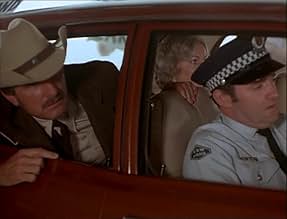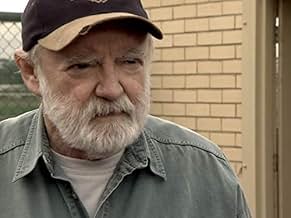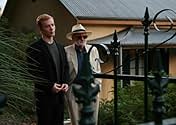Max Cullen(I)
- Actor
- Writer
Idiosyncratic, versatile and highly expressive Australian character actor, possessor of a hangdog look which has proved equally effective in conveying downtrodden or bewildered innocence, mischief or menace. He was born Maxwell Phillip Cullen in Wellington New South Wales, the son of electrical linesman Alec Charles Cullen (1909-1959) and his wife Lila Mary (née Yale). One of his two siblings was the actor Cul Cullen who passed away in 1982. Max left school at fifteen and first worked as a copy boy, running errands for the Sydney Morning Herald. A year later, he joined an advertising company, then, in 1956, he attended Sydney's National Art School to study painting and sculpture. This was followed by another five years spent working for the weekly pictorial magazine Pix and for Woman's Day. After still further studies at East Sydney Technical College, he became a freelance illustrator, cartoonist and layout artist, submitting graphics to various publications.
Trained by American-born actor, stage director and drama coach Hayes Gordon, Cullen first performed on the Aussie stage at the Ensemble Theatre in Kirribilli, Sydney, from 1960. He stayed with the ensemble for ten years, perfecting 'the Method'. In 1972, he joined the newly created Nimrod Theatre Company. Cullen subsequently trod the boards in most of the major cities in both classical and in contemporary Australian plays. The former including Hamlet, The Tempest, Twelfth Night, A Streetcar Named Desire, Waiting for Godot and Death of a Salesman. Among the latter have been Sunday too far away, Emerald City, Summer of the Seventeenth Doll and Sons of Cain. Beginning in 2007, Cullen portrayed the poet Henry Lawson in his one-man-show 'Faces in the Street'. More recently, he teamed up with Warren Fahey (respectively, playing Henry Lawson and A.B. 'Banjo' Paterson) for a five-year national tour of Australia in 'Dead Men Talking'. They followed up with a sequel, 'Dead Men Laughing', this time portraying Aussie humorists Lennie Lower (Cullen) and Roy Rene (Fahey).
Max Cullen has been one of the most familiar faces on the Australian screen, immensely prolific in both films and in serial television (not to mention a classic and very funny set of TV ads, with John Bluthal, for Castrol GTX, ending in the tagline "oils ain't oils"). Following his screen debut in 1966, Cullen had his fist recurring role in the sitcom Mrs Finnegan (1970) (as an obtuse, but well-meaning loser) for which he earned a respectable $300 per week. He was later quoted saying "Hilton was the absolute dope...and you have to think like a genius to play a dope." Far removed from this comic character was that of Barrow, a ruthless interrogator of POW's captured by Colonel Cato's Spyforce (1971) in the Australian World War II espionage series.
In his first important feature film, the iconic Sunday Too Far Away (1975), Cullen played a novice shearing contractor, who, at first, tries to chart a middle course between shearers and property owners. However, when push comes to shove, he sides with his working-class mates against scab labour during the 1956 Shearer's Strike. Though his small stature contrasted sharply from his brawny co-stars (led by Jack Thompson), Cullen more than managed to hold his own through the mental toughness and resilience of his character.
His other varied personae in feature films have included a poetry-loving Irishman in The Office Picnic (1972) and a laconic beekeeper in Spider & Rose (1994), the mature love interest for a crotchety widow (expertly played by the inimitable Ruth Cracknell of Mother and Son (1984) fame). On the darker side of life, Cullen showed his adaptability as a jealous busybody in Summerfield (1977); a hardened career criminal in Hoodwink (1981); a boorish family patriarch in the coming-of-age drama My Brilliant Career (1979); a perpetually drunken garage owner in Boundaries of the Heart (1988) and an eccentric motel proprietor in the acclaimed outback road movie Kiss or Kill (1997). He also had small roles in The Great Gatsby (2013) (Gatsby groupie 'Owl Eyes') and in Marvel's X-Men Origins: Wolverine (2009) (as kindly farmer Travis Hudson, who aids in Logan's escape from Agent Zero).
Often to scene-stealing effect, Cullen has played supporting roles in numerous television dramas, including Riptide (1969), Division 4 (1969), Homicide (1964), Matlock Police (1971), Secret Valley (1980), The Flying Doctors (1986) and Love My Way (2004).
His autobiography, "Tell 'em Nothin', Take 'em Nowhere", appeared in 2010. Cullen is said to reside in an old theatre in Gunning, near Canberra, with his third wife, the renowned painter, sculptor and designer Margarita Georgiadis.
Trained by American-born actor, stage director and drama coach Hayes Gordon, Cullen first performed on the Aussie stage at the Ensemble Theatre in Kirribilli, Sydney, from 1960. He stayed with the ensemble for ten years, perfecting 'the Method'. In 1972, he joined the newly created Nimrod Theatre Company. Cullen subsequently trod the boards in most of the major cities in both classical and in contemporary Australian plays. The former including Hamlet, The Tempest, Twelfth Night, A Streetcar Named Desire, Waiting for Godot and Death of a Salesman. Among the latter have been Sunday too far away, Emerald City, Summer of the Seventeenth Doll and Sons of Cain. Beginning in 2007, Cullen portrayed the poet Henry Lawson in his one-man-show 'Faces in the Street'. More recently, he teamed up with Warren Fahey (respectively, playing Henry Lawson and A.B. 'Banjo' Paterson) for a five-year national tour of Australia in 'Dead Men Talking'. They followed up with a sequel, 'Dead Men Laughing', this time portraying Aussie humorists Lennie Lower (Cullen) and Roy Rene (Fahey).
Max Cullen has been one of the most familiar faces on the Australian screen, immensely prolific in both films and in serial television (not to mention a classic and very funny set of TV ads, with John Bluthal, for Castrol GTX, ending in the tagline "oils ain't oils"). Following his screen debut in 1966, Cullen had his fist recurring role in the sitcom Mrs Finnegan (1970) (as an obtuse, but well-meaning loser) for which he earned a respectable $300 per week. He was later quoted saying "Hilton was the absolute dope...and you have to think like a genius to play a dope." Far removed from this comic character was that of Barrow, a ruthless interrogator of POW's captured by Colonel Cato's Spyforce (1971) in the Australian World War II espionage series.
In his first important feature film, the iconic Sunday Too Far Away (1975), Cullen played a novice shearing contractor, who, at first, tries to chart a middle course between shearers and property owners. However, when push comes to shove, he sides with his working-class mates against scab labour during the 1956 Shearer's Strike. Though his small stature contrasted sharply from his brawny co-stars (led by Jack Thompson), Cullen more than managed to hold his own through the mental toughness and resilience of his character.
His other varied personae in feature films have included a poetry-loving Irishman in The Office Picnic (1972) and a laconic beekeeper in Spider & Rose (1994), the mature love interest for a crotchety widow (expertly played by the inimitable Ruth Cracknell of Mother and Son (1984) fame). On the darker side of life, Cullen showed his adaptability as a jealous busybody in Summerfield (1977); a hardened career criminal in Hoodwink (1981); a boorish family patriarch in the coming-of-age drama My Brilliant Career (1979); a perpetually drunken garage owner in Boundaries of the Heart (1988) and an eccentric motel proprietor in the acclaimed outback road movie Kiss or Kill (1997). He also had small roles in The Great Gatsby (2013) (Gatsby groupie 'Owl Eyes') and in Marvel's X-Men Origins: Wolverine (2009) (as kindly farmer Travis Hudson, who aids in Logan's escape from Agent Zero).
Often to scene-stealing effect, Cullen has played supporting roles in numerous television dramas, including Riptide (1969), Division 4 (1969), Homicide (1964), Matlock Police (1971), Secret Valley (1980), The Flying Doctors (1986) and Love My Way (2004).
His autobiography, "Tell 'em Nothin', Take 'em Nowhere", appeared in 2010. Cullen is said to reside in an old theatre in Gunning, near Canberra, with his third wife, the renowned painter, sculptor and designer Margarita Georgiadis.

























